
-
Find the right food for your petTake this quiz to see which food may be the best for your furry friend.Find the right food for your petTake this quiz to see which food may be the best for your furry friend.Featured products
 Adult Chicken & Barley Recipe Dog Food
Adult Chicken & Barley Recipe Dog FoodSupports lean muscle and beautiful coat for adult dogs
Shop Now Hill's Science Diet Adult Chicken & Beef Entrée Dog Food
Hill's Science Diet Adult Chicken & Beef Entrée Dog FoodChicken & Beef Entrée in a delicious loaf with complete & balanced nutrition to help keep adult dogs active and healthy
Shop Now Adult Large Breed Chicken & Barley Recipe Dog Food
Adult Large Breed Chicken & Barley Recipe Dog FoodSupports healthy joints, lean muscle, and beautiful coat for large breed dogs
Shop NowFeatured products Senior Vitality Adult 7+ Tuna & Vegetables Stew
Senior Vitality Adult 7+ Tuna & Vegetables StewImproves Everyday Ability to Get Up & Go
Shop Now Adult Turkey & Liver Entrée Cat Food
Adult Turkey & Liver Entrée Cat FoodPrecisely balanced nutrition with the delicious taste of minced turkey & liver to help fuel the energy needs of cats during the prime of their life
Shop Now Adult 7+ Indoor Chicken Recipe Cat Food
Adult 7+ Indoor Chicken Recipe Cat FoodSupports energy level and beautiful fur in mature indoor cats
Shop Now -
Dog
- Dog Tips & Articles
-
Health Category
- Weight
- Food & Environmental Sensitivities
- Urinary
- Digestive
- Joint
- Kidney
-
Life Stage
- Puppy Nutrition
- Adult Nutrition
- Senior Nutrition
Cat- Cat Tips & Articles
-
Health Category
- Weight
- Skin & Food Sensitivities
- Urinary
- Digestive
- Kidney
-
Life Stage
- Kitten Nutrition
- Adult Nutrition
Featured articles What Is Littermate Syndrome? Pet Adoption Guide
What Is Littermate Syndrome? Pet Adoption GuideLearn more about littermate syndrome in dogs and cats and how to successfully navigate adoption and early socialization processes.
Read More How to Properly Mix Wet & Dry Pet Foods
How to Properly Mix Wet & Dry Pet FoodsAn Orange cat eating from a bowl filled with mixed food
Read More The Science Behind Our Love for Pets
The Science Behind Our Love for PetsLearn the scientific reasons why we have such strong connections with our pets, and what science says about the love between humans and our furry friends.
Read More -


Congratulations on your new puppy! You're about to embark on a wonderful, albeit challenging, journey, and the more information and support you can get, the better. If you're looking for a puppy training guide that helps you understand normal puppy behavior and how to prevent potential behavioral concerns down the road, you're in the right place. Read on to learn basic training for puppies to help keep them safe — and keep you from pulling out your hair.


Tasty Tips
Young pets may need several visits in their first year for vaccinations. Adult pets generally benefit from annual check-ups, while senior or special-needs pets might require more frequent visits.
What to Expect
Puppies need time to acclimate to you and their new home, and they may feel scared or stressed by new places, people and experiences. Puppies don't act "bad" out of meanness or spite. They simply react to situations with puppy-specific behaviors.
Puppies explore their world by mouthing, chewing, sniffing and pawing. They play loudly and interact with everything (shoes, furniture, your ankles) as though they're toys. When scared, you can expect to hear pitiful, heartbreaking cries of distress. These are all natural behaviors.
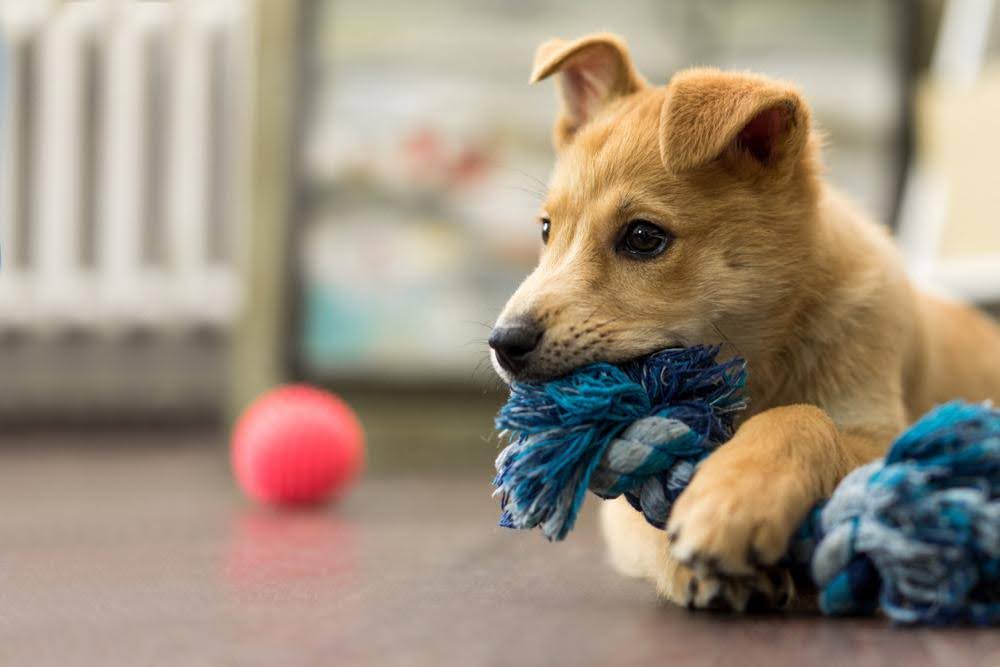
How Puppies Learn
Puppies learn by making mistakes through cause and effect. Start basic training for puppies as soon as your new pet arrives — don't wait for some "golden age." Some learn quickly, while others may take several weeks. Here are the basics of how dogs learn to get you started on the right track.
In Short Bursts
Pups have limited attention spans. Plan several five-minute sessions daily rather than one marathon session, and conduct training sessions in quiet places with no distractions.
By Reaction and Reward
Pups and adult dogs repeat behaviors that reward them. They steal socks because you chase them in a fun game. They potty because emptying feels good. They chew because it relieves teething pain and stress.
Notice how you react to and reward a behavior. Rewards may include treats, your smile, a new toy, petting or anything else your pup likes. Even scolding rewards a pup who hates being ignored. On the other hand, pups tend to stop behaviors that don't reward them.
Remember: Physical punishment or yelling is never appropriate. It will only damage your bond and turn your puppy off of training.
Puppy Training Guide Essentials
Puppy Proofing
Puppy chewing is a common complaint among new pet parents. Puppies chew anything within reach, so puppy-proofing your home minimizes and addresses potential trouble spots. Crawl around on the floor to get on your puppy's level and scope out potentially inviting opportunities, like digging up a potted plant.
Socialization
Any complete puppy training guide includes socialization, which is how pups learn to interact with their world and distinguish between safe and unsafe situations. Include whatever you want your pup to accept as an adult as part of their socialization. For instance, organize a "pass the puppy" party with several friends so your new pet gets used to being handled by friendly strangers.
House Training
Pups "go" wherever and whenever they feel the urge — usually after playing, naps and meals. So, house training begins with planning frequent potty breaks to show your puppy where the approved potty spots are. Between breaks, confine your puppy to easily cleaned areas, such as a crate or gated-off room lined with puppy pee pads.
Crate Training
Crate training works great for house training, so make your puppy's crate one of the happiest places in the house. Try this: Put a special treat inside and close the door, leaving your puppy outside the crate. Let them beg and paw to get the treat for several seconds. Then, open the door and shut them inside to enjoy the treat.
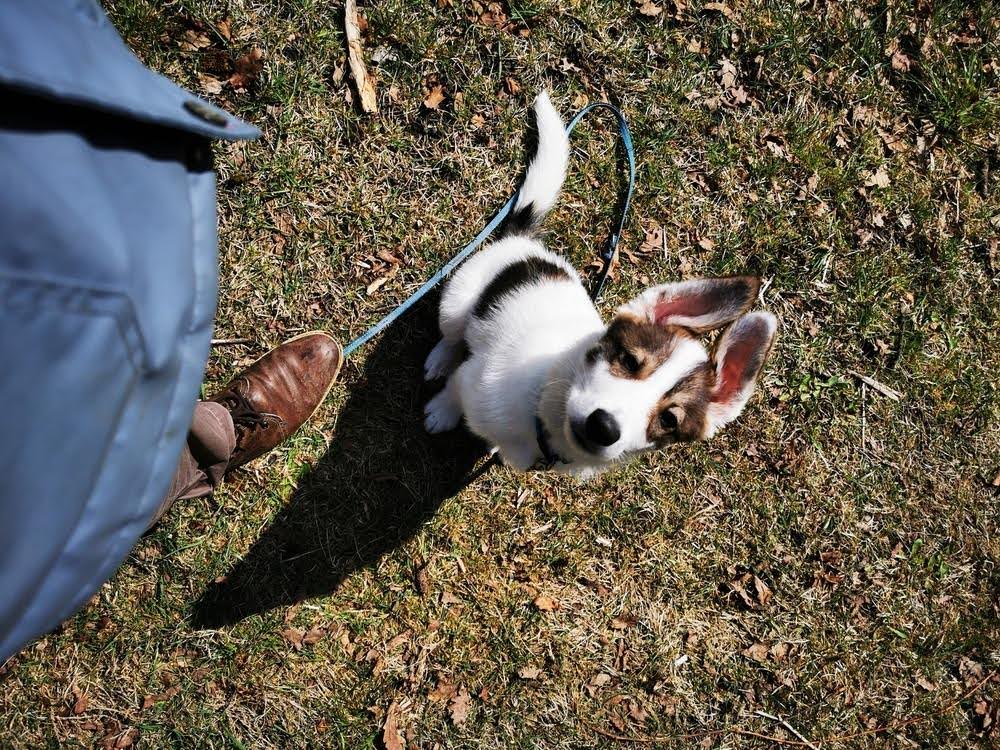
Never Stop Training
Follow this puppy training guide for a positive start, but remember that training is forever. You can build on these basics with more advanced commands once they master these foundational pillars of puppy obedience training. As you go, look for more opportunities to reward your puppy rather than to say "no." By starting immediately, you'll build a great relationship as your puppy grows into the wonderful adult dog they were born to become.


Amy Shojai, is a certified animal behavior consultant, and nationally known authority on pet care and behavior. She began her career as a veterinary technician and is the award-winning author of more than 35 prescriptive nonfiction pet books
Related products

Chicken & Barley Entrée in a delicious loaf with great taste and precisely balanced nutrition to support 5 essential building blocks for lifelong health

Supports healthy joints, lean muscle, and beautiful coat for large breed dogs

Chicken & Beef Entrée in a delicious loaf with complete & balanced nutrition to help keep adult dogs active and healthy

Supports lean muscle and beautiful coat for adult dogs
Related articles
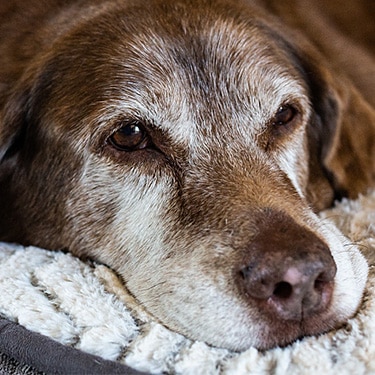
An Old dog laying comfortably on his bed
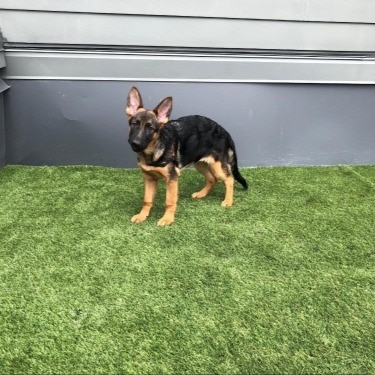
Discover these easy-to-follow tips for successful puppy potty training, helping to ensure fewer accidents in the house and less clean up time for you.
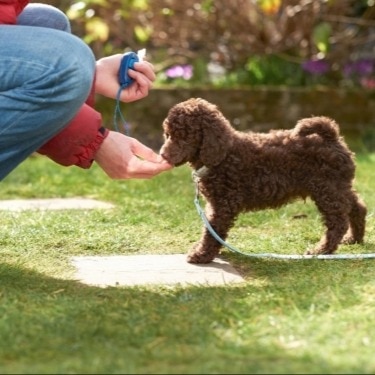
A person bends down to give a brown puppy a treat in a yard on a sunny day.
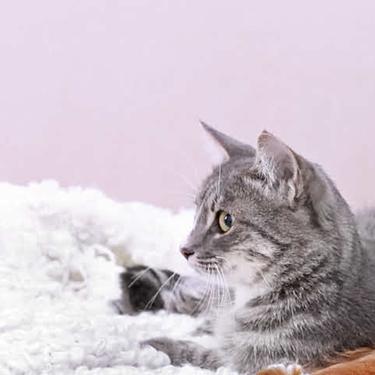
Learn why dogs can be attracted to your cat's litter box, why it's important to keep them out of there and how to discourage them from this behavior.

Put your pet on a diet without them knowing
Our low calorie formula helps you control your pet's weight. It's packed with high-quality protein for building lean muscles, and made with purposeful ingredients for a flavorful, nutritious meal. Clinically proven antioxidants, Vitamin C+E, help promote a healthy immune system.
Put your pet on a diet without them knowing
Our low calorie formula helps you control your pet's weight. It's packed with high-quality protein for building lean muscles, and made with purposeful ingredients for a flavorful, nutritious meal. Clinically proven antioxidants, Vitamin C+E, help promote a healthy immune system.

